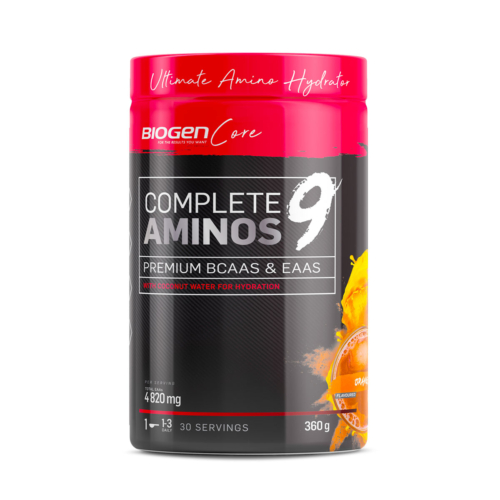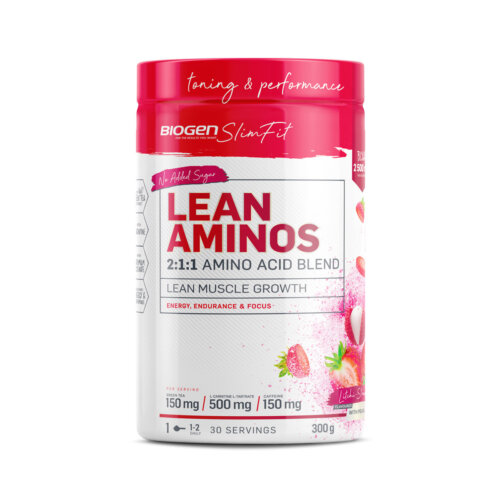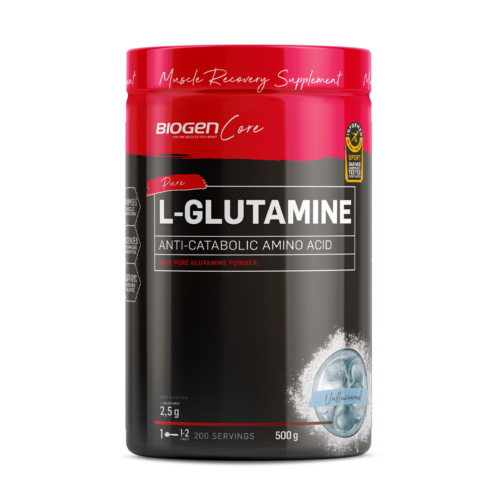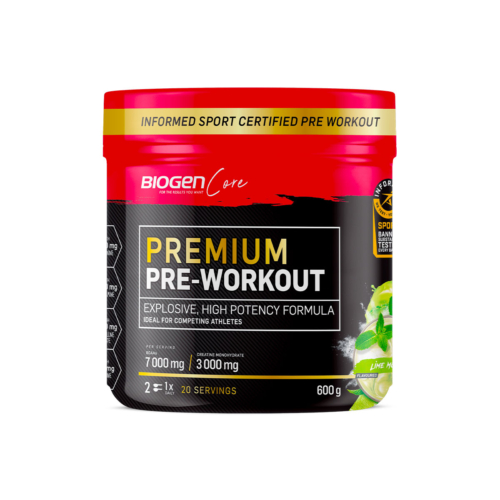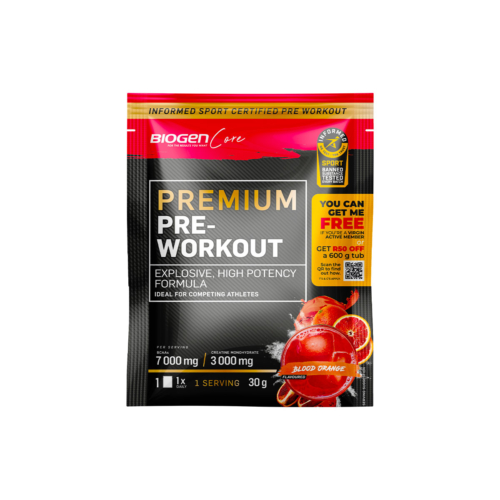
Every athlete should consider the vital role amino acids play in their nutrition plan.
These molecules work to enhance athletic performance in various ways, no matter what sport you participate in.
As the basic building blocks of proteins, these organic compounds are crucial for muscle protein synthesis, a fundamental process in muscle growth and repair.
Beyond this foundational role, they serve diverse functions in the body, from neurotransmission to hormone regulation, and are components in critical structures like haemoglobin (the protein that carries oxygen in your blood) and cell membrane structures.
This broad array of functions underscores their importance not just in physical performance, but also in recovery, overall health maintenance and immune function.
All the aminos
By understanding amino acids, athletes across disciplines can strategically manage their intake to harness the potential benefits of these organic molecules to optimise their training and performance in competition.
There have been about 500 identified amino acids found in nature, however our body commonly makes use of 20, each serving distinct roles in supporting metabolic processes and maintaining muscle integrity. Amino acids are classified in various ways but are broadly categorised as essential, non-essential, and conditionally essential.
Twenty-two amino acids are naturally incorporated into proteins (called proteinogenic or natural amino acids). Of these, 20 are called standard amino acids, and include nine that are considered essential amino acids (EAA).
They are termed essential because the body cannot create them from other compounds. As such, we need to supply them through our diets from foods and supplements that contain animal and plant proteins. The 9 EAAs include:
- Histidine
- Isoleucine
- Leucine
- Lysine
- Methionine
- Phenylalanine
- Threonine
- Tryptophan
- Valine
Among the EAAs, there are three specific amino acids that are vitally important to athletes. Named for their distinct structure, the branched-chain amino acids (BCAAs) include leucine, isoleucine and valine.
Your body uses BCAAs to create other amino acids required in large quantities during intense exercise to repair muscle tissue, produce hormones and provide energy, among other functions.
Some amino acids are considered conditionally essential in certain instances, like during times of illness, stress or high-volume or intense training. Conditionally essential amino acids include arginine, glutamine, tyrosine and glycine. There are also non-essential amino acids (NEAA) that are provided by the liver.
Direct and indirect performance benefits
The most relevant role that amino acids play in the life of an athlete relates to muscle development and tissue repair.
In relation to muscle growth and new tissue formation, amino acids facilitate protein synthesis, which is essential for muscle structure and function. The body makes new proteins from chains of amino acids, which means ensuring a balanced supply of both essential and non-essential amino acids is critical for sustained protein synthesis.
Your muscle cells can also use BCAAs for fuel when glycogen (carb-derived) energy reserves run low. Without adequate circulating levels, your body may start to break down muscle tissue to get these amino acids, and the resultant muscle damage can increase your recovery demands or limit your performance.
Beyond the muscle-building and muscle-sparing benefits, amino acids contribute to overall metabolic health and immune function, supporting athletes in maintaining peak physical condition and resilience against stressors like intense training.
The proteins made by amino acids play essential roles in nearly every biological process in the body, such as producing enzymes that regulate chemical reactions and antibodies that fight infection.
They also produce transport molecules that carry substances throughout the body, like haemoglobin, and hormones that regulate various bodily functions, including various muscle-building (anabolic) hormones needed to support muscle repair and growth in response to training.
Moreover, the non-essential amino acid beta-alanine – found in products like Biogen Pure Beta Alanine and Biogen Premium Pre-Workout – serves as a building block of carnosine, a protein peptide that helps to buffer the effect of exercise metabolites like lactic acid, which build up in muscles during intense or prolonged exercise and can limit performance².
Based on these benefits, beta-alanine supplements could help to extend time to exhaustion, which may improve endurance³.
Meet your amino needs
With such diverse and important roles to play at every stage of activity and recovery, increasing circulating amino acid levels with well-formulated supplements before, during and after training or racing can support your performance and aid muscle repair.
Products that supply free form amino acids – like Biogen Rage Aminos, or Biogen Complete 9 Aminos – are ideal for use before and during sporting events or training.
Boosting circulating levels of amino acids before and during exercise may have a significant muscle-sparing (anti-catabolic) effect.
Limiting exercise-induced damage in this way reduces your recovery demands between training sessions or stages, ensuring better performance at subsequent sessions. And without adequate muscle repair and growth following exercise, you can extend your recovery time, which may result in sub-par performances due to under-recovery.
For these reasons, consuming highly bioavailable complete proteins from sources like Biogen Iso-Whey Protein or Biogen Plant Based Protein may aid in muscle repair and recovery by shifting the body from a catabolic (tissue-breakdown) state into an anabolic, or muscle building state with a beneficial supply of EAAs and BCAAs.
As these complete proteins enter the digestive system, the digestive enzyme pepsin cleaves amino acid bonds to break whole proteins down into their constituent amino acids. The amino acids then enter the bloodstream and are transported in the blood to the cells that require them, including muscle tissue.
Athletes can further tailor their supplementation strategy by considering amino acid ratios and forms that optimise specific physiological responses. For instance, certain combinations of amino acids like L-glutamine, L-arginine, L-ornithine, and L-lysine may enhance natural hormone production, which supports muscle growth and recovery.
Be strategic with your aminos
Based on their various forms and roles, strategically integrating amino acid and protein supplements into your nutrition plan represents a potent tool to optimise your physical performance, enhance muscle development, and maintain optimal health, no matter what your preferred sporting discipline is.
When using amino acids in supplemental form, consider sticking to L-form amino acids. The ‘L’ before the amino acid name refers to the structure of the amino acid, indicating that the amino acid is in a human form and is therefore easier to digest and assimilate.
Shop Biogen Amino Acids
References:
- Ducker KJ, Dawson B, Wallman KE. Effect of beta-alanine supplementation on 800-m running performance. Int J Sport Nutr Exerc Metab. 2013 Dec;23(6):554-61. doi: 10.1123/ijsnem.23.6.554. Epub 2013 Apr 18. PMID: 23630039.
- Culbertson JY, Kreider RB, Greenwood M, Cooke M. Effects of beta-alanine on muscle carnosine and exercise performance: a review of the current literature. Nutrients. 2010 Jan;2(1):75-98. doi: 10.3390/nu2010075. Epub 2010 Jan 25. PMID: 22253993; PMCID: PMC3257613.
- Harrington RN. Effects of branched chain amino acids, l-citrulline, and alpha-glycerylphosphorylcholine supplementation on exercise performance in trained cyclists: a randomized crossover trial. J Int Soc Sports Nutr. 2023 Dec;20(1):2214112. doi: 10.1080/15502783.2023.2214112. PMID: 37229544; PMCID: PMC10215009.


